Media criticism linked to low trust in news—Digital News Report 2023
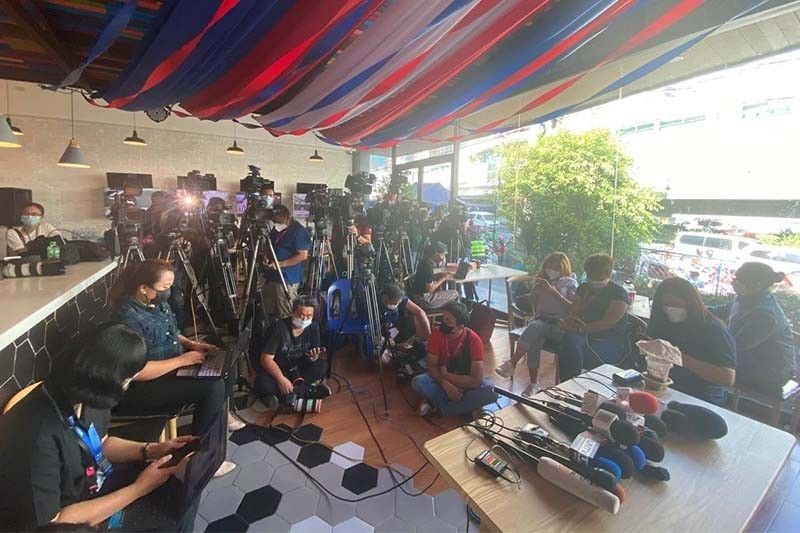
MANILA, Philippines — An overwhelming majority of adult Filipinos have come across people criticizing journalists or the news media in the country, with nearly half of them tagging politicians and ordinary people as the leading sources.
The high level of criticism is associated with low trust in the media in the Philippines and several other countries, according to this year’s Reuters Institute Digital News Report (DNR) released globally on June 14.
DNR 2023 also documented the steadily declining interest in news among Filipinos, their continuing avoidance of news and the high degree of wariness when they talk about politics both online and offline, among others.
Now on its 12th edition and considered the most comprehensive global study of news consumption trends, the report draws data from an online survey of 93,895 adults in 46 media markets conducted in late January to early February. A total of 2,284 Filipinos participated in the survey.
In the Philippines, 91% of respondents say they have seen or heard criticism of the news media or journalists, with 63% reporting it as “very” or “quite often,” surpassing the average of 53% across all markets.
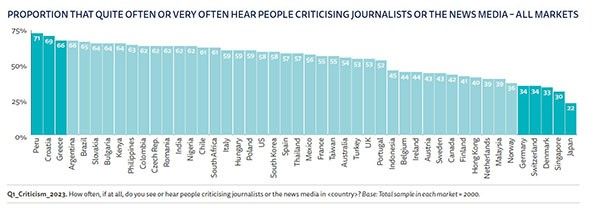
The report said politicians in the Philippines, the United States and Mexico have emerged as the primary source of criticism toward journalists. The Philippine news media have been heavily criticized by politicians (46%) and ordinary people (48%), followed by celebrities and influencers (41%). (DNR does not consider differences of +/- 2 percentage points as significant.)
At least 75 incidents of threats and attacks against journalists or news organizations, mostly by state agents, have been recorded since President Ferdinand Marcos Jr. took office on June 30 last year, according to a report on the state of press freedom in the country. Thirty-one involved “redtagging” or being branded a communist or terrorist.
DNR 2023 has detected a correlation between low levels of trust in news and media criticism.
“Some of the highest reported levels of media criticism are found in countries with highest levels of distrust, such as Greece, the Philippines, the United States, France and the United Kingdom,” it said. “The lowest levels of media criticism are often in those with higher levels of trust, such as Finland, Norway, Denmark and Japan.”
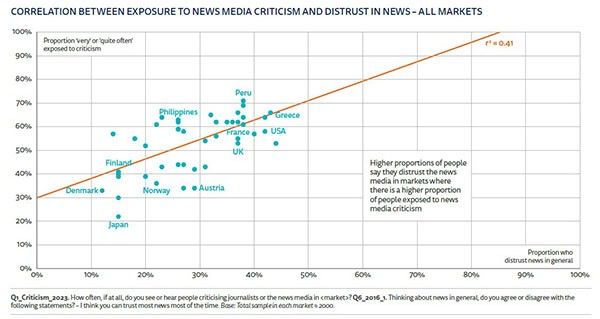
Overall trust in the news among Filipinos (38%) has held steady since last year but lags behind the global average (40%) and remains the lowest among the five Southeast Asian media markets covered in the annual study. Filipinos under 35, in fact, are more likely to disagree that they can trust news most of the time.
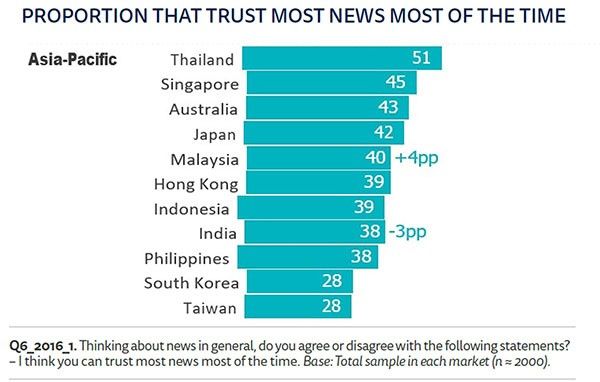
Reflecting the trend across the 46 media markets, self-declared interest in news has declined steadily in the Philippines. Only 52% of Filipinos now say they are “extremely” and “very” interested in news in contrast to a high of 69% in 2020 when the Philippines was first included in the study.
More Filipinos (47%) also intentionally avoid news “sometimes” or “more often” than news consumers in other markets (36%). The proportion climbs to 78%, when those who “occasionally” try to avoid news are included, exceeding last year’s 75%.
More than half of Filipinos (54%) have been tuning out news by checking it less often, including disabling notifications. Half avoid certain sources, scrolling past news or changing channels when news comes on. More than a fourth (28%) shun specific news topics like those that dampen their mood or increase anxiety.
Unsurprisingly, 89% of Filipinos avoid hard news, particularly topics related to national politics (45%) and social justice (33%) such as race or gender inequality and rights.
Declining interest and growing avoidance of news have adversely affected consumption of traditional media sources. On the whole, it has declined 15 percentage points to 59% since 2020.
Specifically, the percentage of Filipinos relying on TV as a source of news has decreased from 66% in 2020, when government closed the largest network, ABS-CBN, to 52% this year (-14 points). Radio news consumption has dropped from 25% to 17% (-8 points) and print from 22% to 14% (-8 points) over the same period.
Although news consumption among Filipinos is mostly online (86%) and through social media (70%), the growth has been sluggish since 2020 and has actually declined over the past year.
For example, 70% of Filipinos use social media as a news source this year, down 3 points from last year. Usage of digital-born or digital-first media brands has also fallen from 76% in 2020 to 63% this year (-13 points).
Filipinos’ participation in news online has likewise dipped.
While DNR 2023 classifies Filipinos as among the more “active participators” (those who comment on a news story in a social network or a news website), the Philippine average of 34% is a far cry from the 54% first recorded in 2020. The average across all markets this year is 22%.

The number of Filipinos sharing news online is also lower, dropping from 51% to 47% over the past three years. They are also less likely to talk about a news story online (24%, down 3 points from 2020) and face to face (25%, down 6 points).
Gen Z or Zoomers (ages 18 to 24) are even less likely to share news (43%) and comment on it (27%) but more likely to talk about it (42%).
While only more than half of respondents across all 46 media markets worry about what they say about politics online (54%) and offline (52%), the level of wariness is higher among Filipinos: 81% online and 78% offline.
The report said markets with more active participators such as the Philippines tend to have more people concerned about political conversations online.
It also said, “These perceptions are particularly high among respondents in countries such as the Philippines (81% online, 78% offline) and Peru (70% online, 67% offline), where citizens may feel the chilling effects of political unrest, online intimidation tactics, or other threats to free expression.”
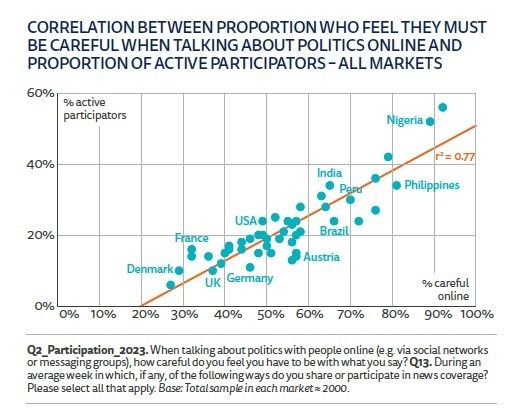
Filipinos express greater concern over misinformation and disinformation (64%) compared with the global average (56%). The proportion has grown 7 points from 57% in 2020.
DNR 2023 reported that Facebook is becoming much less important as a source of news in most markets, especially in the Global South, as TikTok and other video-based networks gain ground.
In the Philippines, Facebook remains the leading news source (72%), but the country now ranks among markets with the highest use of TikTok for news and other purposes.
TikTok’s usage as a news source of Filipinos has dramatically grown from a mere 2% in 2020 to 21% this year (up 19 points) and from 7% to 42% (up 35 points) for all purposes. Usage is particularly high among Zoomers, with 32% using it for news and 58% for all purposes.
Save for Twitter, Filipinos pay attention more to personalities than mainstream or alternative brands or journalists when accessing news on social media. But there is greater preference for hard news than soft news across platforms, except for Instagram.
In contrast to the global trend, where most respondents prefer to read the news (57%) than watch (30%) or listen to it (13%), Filipinos deviate from the pattern: 52% would rather watch the news than read (36%) or listen to it (12%). Interestingly, Gen Z Filipinos are less likely to watch the news (47%) than other age groups and more likely to listen to it (15%).
For Filipinos, Facebook (63%) is the biggest outlet for online news-related videos, followed by YouTube (51%), a new site or app (32%), TikTok (21%), Twitter (13%) and Instagram (12%).
However, Gen Z Filipinos have a higher consumption of these videos on TikTok (34%) and Twitter (20%).
(Yvonne T. Chua is an associate professor of journalism at the University of the Philippines. She wrote the profile on the Philippines for the Digital News Report 2023.)
- Latest
- Trending
































